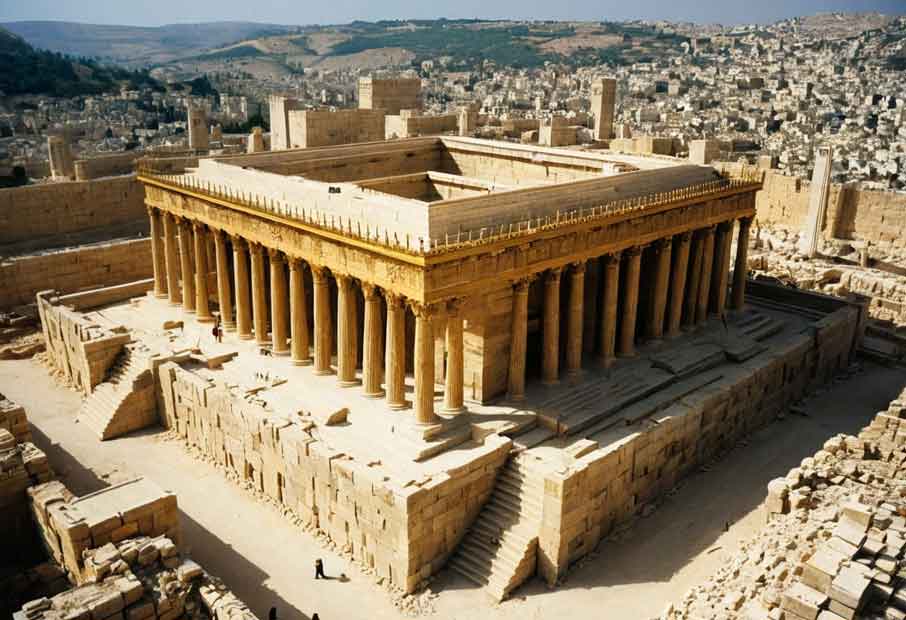Explore the profound symbolism of gold in the Bible, representing purity, divinity, and spiritual wealth. From its role in significant biblical narratives to its economic implications in ancient societies, gold serves as a reminder of the connection between the material and the divine. Delve into key theological insights and understand how gold transcends mere wealth to embody spiritual truths and the promise of eternal life. Discover how the symbolism of gold encourages believers to reassess their values in relation to faith and moral integrity.
The Color Gold in the Bible: Divinity and Kingship

Gold in the Bible represents more than mere material wealth; it serves as a profound symbol of purity, divinity, and a connection to the sacred. This precious metal holds a significant place throughout the scriptures, often associated with the glory of God and the divine. The term “gold in the Bible” resonates deeply within the text, serving as a foundational theme that illustrates how the divine interacts with humanity. Its presence is marked in various contexts, from the opulence of the Temple in Jerusalem to the gifts the Magi presented to the infant Jesus, reflecting its role in both religious and cultural traditions.
The significance of gold extends beyond its physical attributes; it embodies an ideal of spiritual richness and moral elevation. In the Old Testament, gold is frequently mentioned in relation to important artifacts, such as the Ark of the Covenant, which was adorned with pure gold, signifying God’s presence among His people. These references highlight how gold serves as a medium through which the divine interacts with the earthly realm, showcasing its multi-faceted symbolic meanings ranging from wealth to holiness.
Historical Context of Gold in Biblical Times
Gold has held a prominent position throughout human history, particularly during biblical times, where it not only represented wealth but also spiritual significance. In the ancient Near East, the value of gold in trade and economy was paramount. It served as a medium of exchange and a durable store of value, facilitating commerce among emerging nations and tribes. This precious metal was often associated with royalty and divinity, leading to its elevation beyond mere economic utility to a symbol of power and sacred authority.
Gold’s importance is notably illustrated in the construction of the Tabernacle, the portable sanctuary used by the Israelites during their exodus from Egypt. According to the Book of Exodus, gold played a critical role in the design of the Tabernacle, where it adorned the Ark of the Covenant, the altar, and various furnishings, symbolizing God’s divine presence among His people. Similarly, King Solomon’s Temple, considered a paramount architectural feat in ancient Jerusalem, was completed with immense contributions of gold. The temple was not only a center for worship but also an emblem of the nation’s wealth and Davidic lineage.
Furthermore, artifacts such as golden jewelry, vessels, and coins discovered in archaeological sites provide tangible connections to the biblical narratives regarding gold. These items reveal the sophisticated craftsmanship of ancient cultures and their relationship with this precious metal. For instance, the mention of gold in the account of the Magi presenting gifts to the infant Jesus underscores its enduring significance in religious practices. Through these historical contexts, gold in the Bible emerges not merely as a monetary element but an instrument that shaped relationships, influenced trade dynamics, and signified divine favor, reinforcing its revered status in ancient societies.
Symbolic Meanings of Gold in the Bible
Throughout the scriptures, gold serves as a potent symbol with rich connotations that transcend its material value. One of the most significant interpretations of gold in the Bible is its representation of divinity and the presence of God. For instance, in the description of the Ark of the Covenant, which housed the tablets of the Law, the use of gold reflects not only the preciousness of God’s words but also emphasizes His holiness. This connection between gold and divine presence is further supported by various verses that highlight how gold is associated with God’s glory and majesty.
Moreover, gold embodies purity and perfection within biblical texts. In Malachi 3:3, it is stated that God will purify the sons of Levi as one refines gold and silver. Here, gold symbolizes the refining process of spiritual growth, illustrating the transition from impurity to holiness. Such metaphors encourage believers to embrace trials as opportunities for developing faith and a closer relationship with the divine. The symbolism of gold also extends to represent the ultimate reward of eternal life, where believers are envisioned as walking on streets of gold in the New Jerusalem, as indicated in Revelation 21:21. This imagery serves to inspire hope and convey the invaluable nature of the heavenly promise.
The understanding of gold evolves seamlessly throughout the biblical narrative. While it initially signifies status and wealth in the context of kings and temples, it later transforms into a metaphor for spiritual richness. This transition illustrates how spiritual fulfillment surpasses material wealth. Hence, gold in the Bible ultimately becomes a representation of the believer’s journey towards divine communion, underscoring the enduring significance of this sacred element in shaping faith and community spirituality.
Gold in Key Biblical Stories and Narratives

Throughout biblical history, gold emerges as a significant motif, often symbolizing divine presence, wealth, and moral lessons. One of the most well-known narratives involving gold is the story of the golden calf found in Exodus 32. In this account, while Moses is receiving the Ten Commandments on Mount Sinai, the Israelites, fearing his absence, create an idol from their gold jewelry. This act of idolatry illustrates the tension between faith in God and the temptation of materialism. The golden calf not only represents a grave error in judgment but also highlights the challenges of faith in a tangible world where gold can lead one astray.
Another pivotal narrative involves the gifts of the Magi in the Gospel of Matthew. The Magi travel from the East to pay homage to the newborn Jesus, presenting him with gold, frankincense, and myrrh. The inclusion of gold among these gifts is highly symbolic, representing Jesus’ kingship and divine nature. This story emphasizes gold as not merely a valuable commodity but as something that acknowledges and honors the greatness of Christ, solidifying its significance in Christian theology.
The construction of Solomon’s Temple further underscores the importance of gold in biblical contexts. In 1 Kings, King Solomon is described as using gold lavishly to construct a temple for the worship of the Lord, demonstrating the value of purity and devotion. The temple adorned with gold symbolizes not only the glory of God but also the aspiration of faith communities to create spaces where the divine can dwell among them. This narrative reaffirms how gold serves as a profound representation of religious devotion and reverence.

The narratives surrounding gold in the Bible encompass deeper theological insights and reflections on human nature, illustrating its multifaceted representation throughout scripture. Each story, rich with cultural implications, offers valuable lessons on the relationship between material wealth and spiritual integrity, reminding believers of the enduring power and significance of gold in their faith journey.
Theological Insights on Gold’s Representation of God
In biblical texts, gold is frequently employed as a symbol of divine glory and majesty, reflecting the nature of God and His kingdom. The use of gold in the Bible transcends mere aesthetics; it embodies the essence of divine wisdom and serves as a testament to the sanctity of the covenant relationship between God and His people. The brilliance and purity of gold are often metaphorically tied to the attributes of God, emphasizing His holiness and superiority.
The scholar John Goldingay highlights that gold represents God’s glory, stating, “The use of gold in the temple signifies the splendor of God and the value of His presence among His people.” This perspective underlines the belief that gold, in its pristine form, illustrates the perfection of divine wisdom. Furthermore, references to gold in the context of worship, such as in the construction of the Temple of Solomon, demonstrate a tangible expression of honoring God’s majesty through the materials chosen for sacred spaces.
Additionally, throughout the Scriptures, gold is used to convey God’s immeasurable value and the richness of His kingdom. The value ascribed to gold serves as a comparison to the wealth found in spiritual truths. Theologians often express that gold symbolizes the lasting nature of God’s promises, as opposed to earthly treasures that may fade away. For instance, the Apostle Paul in 1 Corinthians 3:12 speaks of building on the foundation of Christ with materials of gold, underscoring the enduring worth of divine wisdom and the significance of aligning one’s life with spiritual principles.
The role of gold in the Bible, therefore, extends beyond a mere element of wealth to become an integral part of understanding the divine character of God. This understanding encourages believers to appreciate the spiritual lessons woven into the very fabric of their faith, as gold becomes a symbol of God’s majestic nature and the inherent beauty of divine wisdom.
Economic Impact of Gold on Biblical Society

The significance of gold in the Bible extends beyond its spiritual connotations, deeply intertwining with the economic structures of biblical societies. Gold served as a fundamental form of currency, facilitating trade and commerce. Its intrinsic value and rarity made it a preferred medium for transactions. Historical texts illustrate how gold was meticulously weighed and evaluated, functioning not only as money but also as a standard of wealth. This utility of gold in economic exchanges positioned it as a backbone of early economies, influencing both local and long-distance trade.
Moreover, gold’s presence in commerce shaped social dynamics within biblical communities. The accumulation of gold often dictated one’s social status and influence, leading to a concentration of wealth among the elite. Consequently, the disparity in wealth distribution could create societal tensions and class divisions, paving the way for moral and ethical dilemmas inherent in the pursuit of riches. These dynamics indicate that while gold in the Bible was a symbol of prosperity, it also carried potential pitfalls that influenced the overall moral fabric of society.
The understanding of gold in biblical contexts sheds light on broader themes that resonate with contemporary issues. Today, as socioeconomic gaps widen in many societies, the lessons from biblical times concerning wealth and its implications remain relevant. Just as gold once dictated societal structures, modern economies grapple with similar challenges pertaining to wealth concentration and its effects on social mobility. Through examining gold’s multifaceted role in historical contexts, we gain valuable insight into the ongoing discourse surrounding economic equality and ethical considerations in wealth accumulation. In the end, gold serves as a reminder of the delicate balance between prosperity and moral integrity, a theme that continues to echo through generations.
Gold in Prophecy and Eschatological Imagery
Throughout color in the Bible texts, gold serves as a profound symbol of divine promise and eschatological hope. Within prophetic literature, gold often appears as a representation of restoration and purity, epitomizing the richness of God’s kingdom. For instance, in the Book of Revelation, the New Jerusalem is described as being adorned with gold—its streets paved with pure gold, reflecting a heavenly glory that signifies the ultimate fulfillment of God’s covenant with humanity (Revelation 21:18-21). This powerful imagery illustrates not only material wealth but also spiritual richness that believers can expect in the eschaton.
Gold in the Bible further encapsulates the essence of God’s unwavering fidelity. The prophetic visions of Old Testament prophets, such as Isaiah, often present gold as a representation of the blessings that come from a faithful relationship with God. Isaiah 60:6 speaks of nations bringing gold as offerings, symbolizing reverence, acknowledgment, and the international recognition of God’s sovereignty. Such imagery invites believers to acknowledge the divine promise that transcends present circumstances, pointing to a future filled with hope and restoration.
Additionally, prophetic texts suggest that gold symbolizes purity and sanctification. In passages that deal with the altar and offerings, gold is emphasized as a material that denotes holiness and the importance of presenting oneself before God in an unblemished state. This recurring theme encourages contemporary believers to reflect on their spiritual practices, urging them to pursue a life characterized by integrity and devotion. The role of gold thus becomes a vital reminder of God’s promises, highlighting its significance as not merely a material entity but as a profound symbol of hope and divine assurance that resonates through generations.
Understanding the Metaphorical Uses of Gold

Throughout the biblical text, gold serves not only as a tangible material but also as a profound metaphor that enriches the spiritual narrative. This precious metal often symbolizes righteousness, reflecting purity and divine perfection. For instance, in Proverbs 17:3, the purity of gold is likened to the refining of one’s heart, suggesting that just as gold is purified through fire, so too can one’s character be enhanced through trials and tribulations. Such metaphors allow readers to understand the transformative power of faith in shaping one’s virtues.
Gold in the Bible frequently epitomizes the divine nature and the glory of God. In Revelation 21:18, the streets of the New Jerusalem are described as being made of pure gold, indicating the unparalleled majesty and sanctity of the heavenly realm. This portrayal not only highlights the beauty of divine creation but also emphasizes the high value associated with a life dedicated to spiritual pursuits. The heavenly city, adorned with gold, can be seen as a metaphor for the ultimate reward awaiting those who remain steadfast in their faith.
Furthermore, the human soul’s intrinsic worth is often illustrated through the metaphor of gold. In Matthew 13:44, the kingdom of heaven is compared to a treasure hidden in a field, signifying the immense value of spiritual truths that one must seek fervently. This notion aligns with the understanding that each individual possesses a soul of immeasurable worth, comparable to gold itself. Such metaphorical uses of gold deepen our appreciation for its role in highlighting essential spiritual themes, enriching our personal journeys toward greater faith and understanding.
Conclusion: The Enduring Legacy of Gold in Scripture
Throughout the biblical narrative, gold emerges as a significant and multifaceted symbol, representing divine presence, purity, and spiritual value. Its usage spans from the construction of sacred spaces, such as the Tabernacle and the Temple, to its roles in religious rituals and symbolic references to God’s glory. The sanctity associated with gold in the Bible not only highlights its material worth but also underscores the deeper spiritual truths it conveys.
The prominence of gold is evident in its depiction as a metaphor for divine qualities. For instance, when describing God’s attributes, gold serves to illustrate purity, perfection, and unapproachable majesty. Moreover, gold is frequently contrasted with earthly treasures, emphasizing the notion that true wealth lies not in material possession but in spiritual richness. The narratives surrounding gold compel believers to reassess their values and priorities, urging a move away from materialism toward a deeper faith and understanding of God’s sovereignty.
As we reflect on the place of gold in the Bible, it invites us to examine our own perceptions of wealth and prosperity in relation to our spiritual journeys. This contemplation encourages a more profound engagement with Scripture, challenging us to understand the broader implications of biblical symbolism. Additionally, readers who are intrigued by the significant meanings found within different colors may consider exploring other biblical colors, such as red, blue, white, and green. By delving into these themes, one can appreciate the rich tapestry of meanings woven throughout Scripture, enhancing both faith and spiritual understanding.









